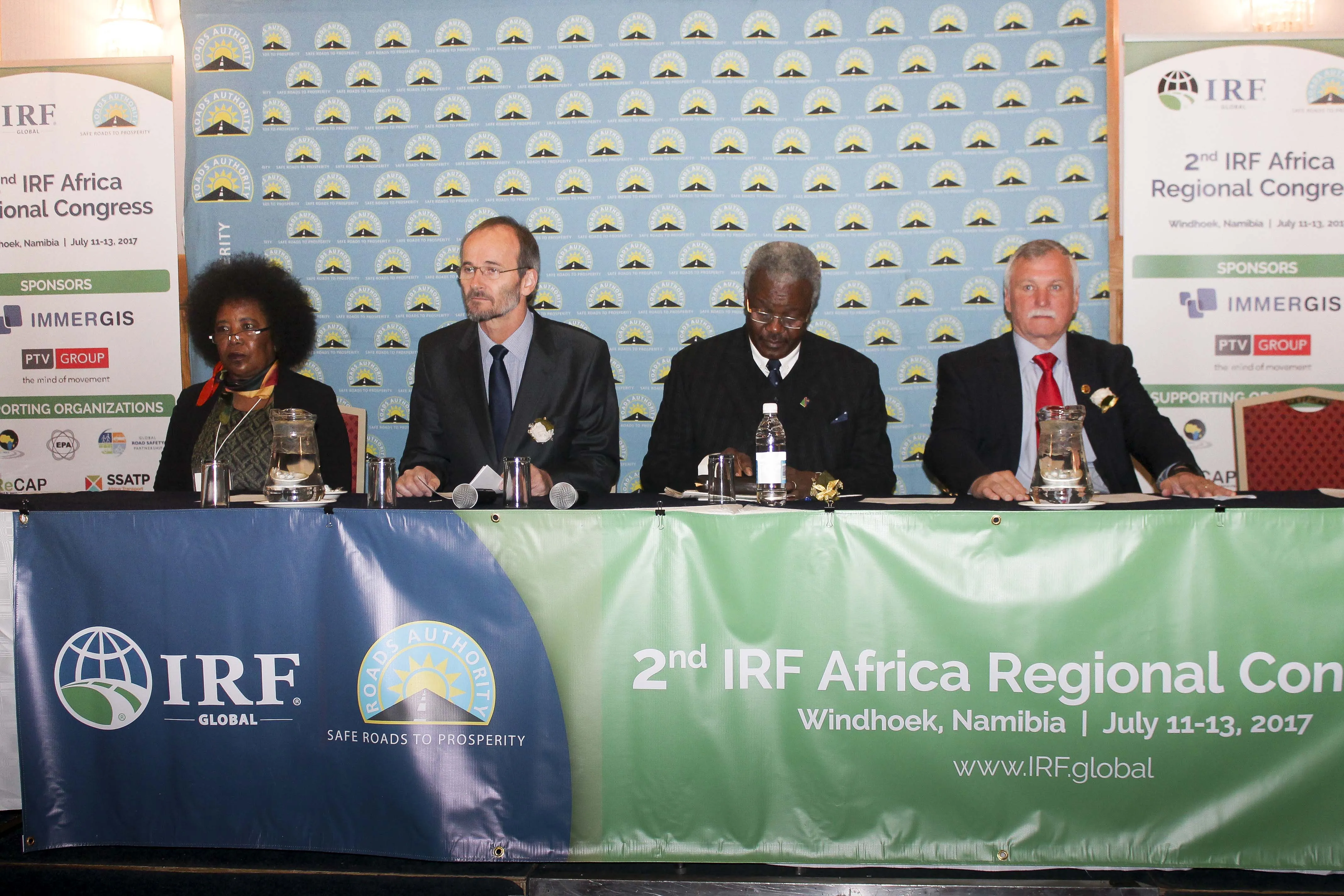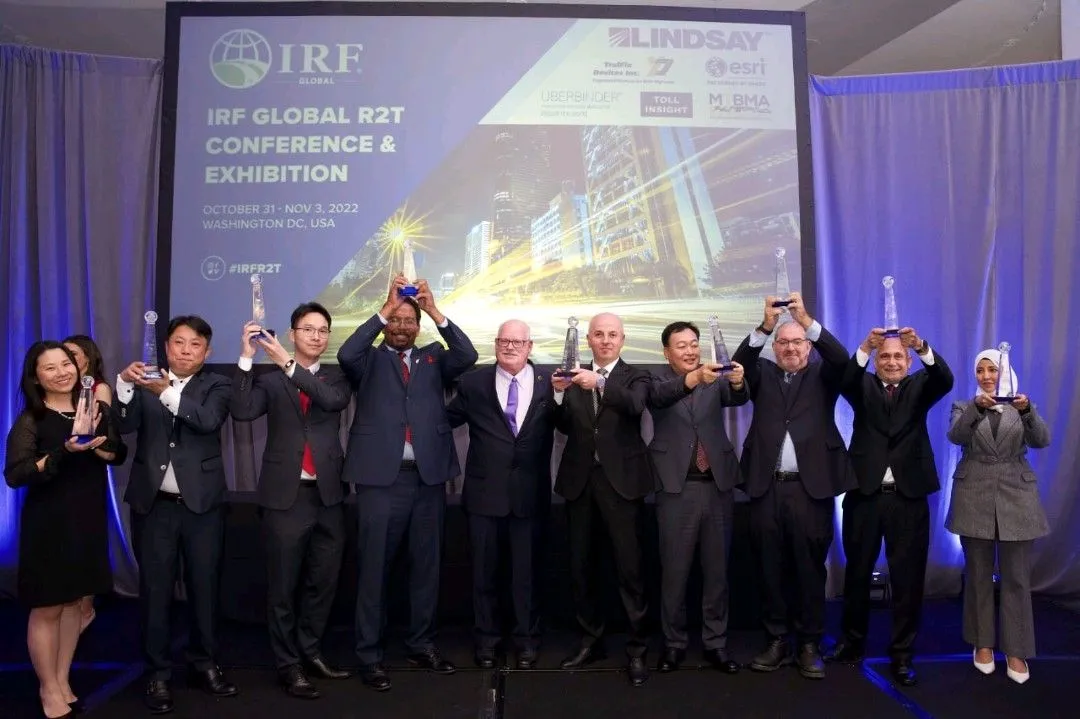
The 18th World Road Meeting of the International Road Federation took place between 14-17 November 2017 in the North Indian state of Uttar Pradesh at Greater Noida near India’s capital New Delhi. Close to 1500 delegates and visitors across the world - including India - from the road infrastructure fraternity participated at the global event. The Cross Roads meeting, coinciding with an exhibition on solutions for road safety and rehabilitation saw an array of power-packed presentations, featuring newer interventions on every facet of road infrastructure involving construction, safety, rehabilitation, risk management and resource optimisation for effective maintenance.
Making the keynote address, on safe roads and smart mobility, KK Kapila, chairman, International Road Federation (IRF) Geneva said, “Road safety assumes the highest importance. This is due to 1.2 million people/year perishing globally due to road crashes, resulting in a colossal loss of human and economic resources. According to estimates, close to US$1.8 trillion is lost due to road crashes.”
Sharing his concern on road accidents with possible remedial measures, RC Bhargava, non-executive chairman, Maruti Suzuki India, the country’s largest passenger car manufacturer said, “It is necessary to have proper cause analysis for road crashes to curtail fatalities. This has to be through studying the pattern of road usage. Crash cause analysis and pattern of road usage has to be through right data collection, which ironically is deficient in India. Data collection has to be from reliable sources and scientifically oriented.”
Sharing similar views, Jeffrey P Michael, associate administrator, National Highway Traffic Safety Administration said, “With rising economic activities across the world, there is dire need for faster mobility. However, mobility needs to be safe as well. For the prevention of accidents, collation of data will have to be right evidence-based.”
Luciana Lorio, chair of the Global Road Safety Forum said, “Airbags will be required to be developed on a larger scale to curtail accidents. Equally vital will be scientific data collection.”
Jean Todt, FIA president, UN Secretary General Special Envoy On Road Safety said, “Stricter enforcement of legislation will be one of the vital tools for accident prevention.”
“To curtail crashes NHAI has identified 786 highly accident-prone spots on its network. INR 12,000 crores will be invested for checking accidents on those spots. For safe pedestrian movements construction of underpasses will be taken up in a major way,” said Gadkari.
Marc Garneau, Minister of Transport, Canada said, “Our strategy is adaption of newer transportation technologies featuring higher levels of safety and zero emissions.”
“Finland’s focus will be to move towards adaption of intelligent transportation solutions and optimisation of transportation assets for higher interoperability,” said Anne Berner, Finland’s Minister of Transport and Communication.
Sharing details on a comprehensive action plan to restrict road accidents, Francois Bausch, Minister of Sustainable Development and Infrastructure, Luxembourg said, “We are working towards ‘Vision Zero Accidents’ through an holistic action plan. This is through primarily improving road infrastructure, installation of automated speed cameras and advanced signalling systems on dangerous roads. Secured infrastructure for cyclists and sensitising people towards having the right approach when moving on dangerous roads is also part of the action plan for Vision Zero Accidents.”
The 18th Cross Roads World Road Meeting witnessed comprehensive deliberations on managing road assets among delegates. They unanimously agreed that optimisation of resources is vital, since road asset management is cost intensive across the world.
Sharing the approach for cost-effective provision for low volume roads in South Africa, South Africa expert Matthew Townshend said, “There are close to 459,957km of gravel roads in South Africa and 67% of those are in poor condition. Taking cognisance, investments were channelised, followed by carrying total lifecycle cost analysis for maintenance and rehabilitation based on comprehensive traffic studies.”
Namita Akojam, director, Delhi-based, Betq Data Analytics, shared information on the company’s newly developed, portable automated road survey system. She said, “The system mounted on a vehicle captures pavement data, processes and analyses them with 94% accuracy as compared to a manual method of data collection.”
The event had sessions on innovative road infrastructure. The presentation was made by Lt General Ravi Shankar, president Intercontinental Consultants, on the advantages of prefabricated steel bailey bridges as they can be quickly launched. Representatives of Indian construction major, Afcons, shared details on the new push launching method it adapted for a steel truss road over a busy rail corridor in North India. Kazunori Nobushige from Japan shared the advantages of thick epoxy resin paints. The paint applied on the busy Honshu Express Way Bridge in Japan followed by undertaking cost analysis, showed higher weather resistance and gloss resistance as compared to polyurethane paints, resultantly delivering the extended repainting cycle.
The four-day event concluded with a special session on the importance of asset management by the World Road Association, with concern shared by Jean Claude Roffe, vice president, European Road Federation that investments have gone down in Europe. This has pushed the cost of maintenance of the road assets, citing the example of Leverkusen Bridge in Germany, where an estimated €80 million was spent in 2013 after prolonged maintenance gestation. He expressed his concern on deficient data of maintenance investments and expenditure for European Roads.
Delegates and visitors share heightened expectations from the IRF event
Delegates and visitors shared heightened positive expectations from the 18th IRF World Roads Meeting. Speaking to World Highways, NK Sinha, chairman, IRF, Indian Chapter, and Susanna Zammarto, executive director,
Amit Kumar Ghosh, joint secretary, Ministry of Road Transport & Highways, Government of India said, “The event is significant as it will enable knowledge sharing for improved project management practices, cost-effective, road rehabilitation project solutions and newer resource optimisation practices. Precisely, it will be beneficial towards acceptance of newer technologies for safer vehicle movements, like signage and newer crash barrier variants. This is likely to minimise the higher levels of road crashes caused in North India during foggy weather conditions in the winter months.”
Participants keenly looked at the event for gaining newer insights for sustainable road construction and maintenance practices in conjunction with safer and faster projects execution as well. Mir Afroz, managing director, Jammu Kashmir State Road Transport Corporation said, “The ecology and environmental condition in Jammu and Kashmir region is extremely fragile. Environmentally friendly road construction practices supported by the appropriate technology will be beneficial to preserve the temperate of the region. Upward movement of the temperature, as witnessed recently, can prove detrimental in the long run as tourism and horticulture is one of the main economic activities in the state.” He added, “I am looking forward to gaining knowledge on newer bridge and tunnel construction and maintenance methods. This is because acute snowfall causes closure in conjunction with damage to major roads in the state during winter months.”
“Road projects owners like National Highway Authority of India (NHAI) and the State Highways are well expected to gain from the deliberations of the event on safe movement of vehicular transportation and newer avenues of risk management for road maintenance,” said DO Tawade, member technical (NHAI), while participating at the event.









